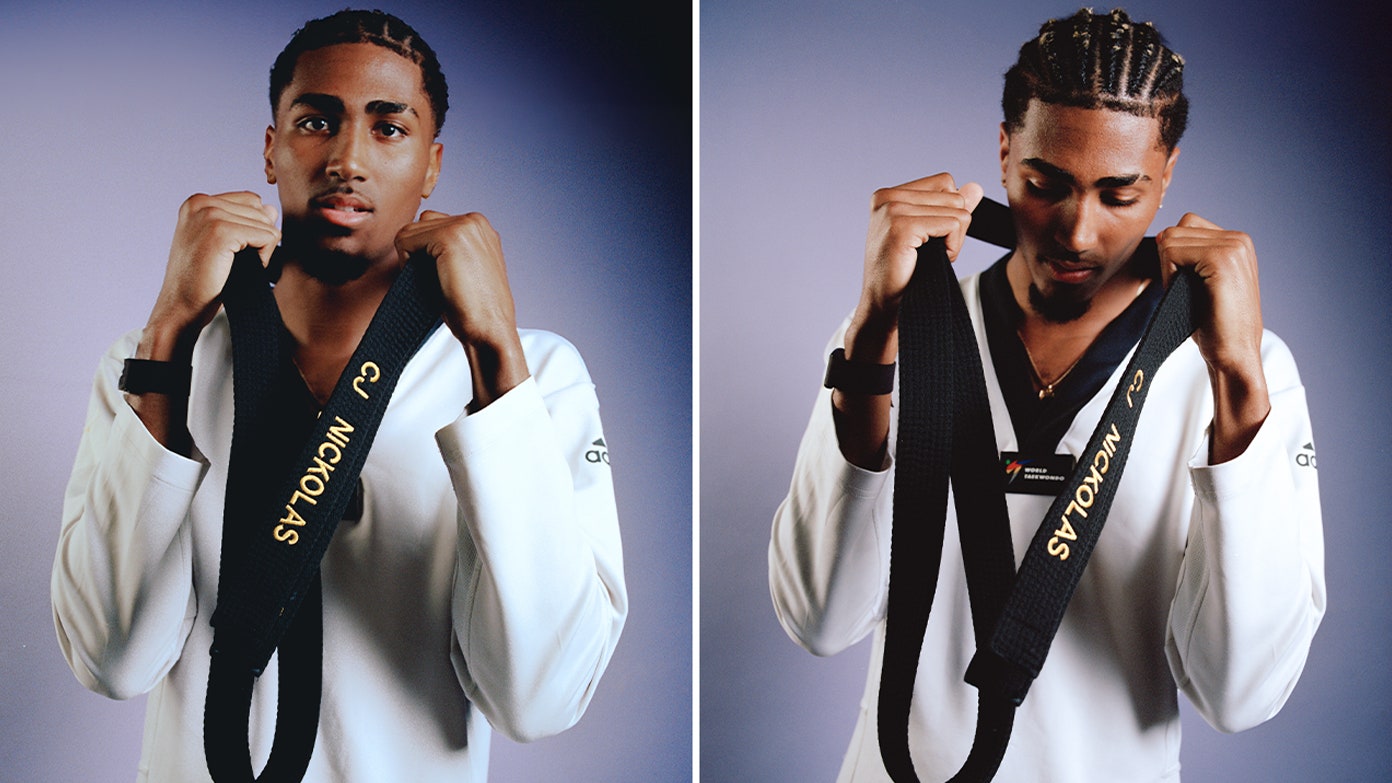
Taekwondo Champ CJ Nickolas’s Journey to the Olympics Was a Family Affair

CJ Nickolas gets it from his mama. While the Olympics-bound Taekwondo champ was the first to solidify his spot to Paris on Team USA, his story began years ago in the Bay Area, where he came into the sport alongside his mom.
“I started Taekwondo when I was three,” Nickolas tells Teen Vogue. “I was watching Power Rangers or Teenage Mutant Ninja Turtles and I was very energetic as a kid, so my mom wanted me out of the house.”
Nickolas’ mother joined him in the early days of his training. “She was taking classes and she was better than me and she kept going up until two years ago — I had to make her stop,” he says with a laugh. “She was fighting 18-year-old girls and she’s 63. She got home with bruises and stuff. I was like, ‘shorty, you gotta chill.’”
Now, Nickolas, 22, is number two in the 80kg division world Taekwondo ranking and (at least now that his mom is out of the game) is sort of in a league of his own. During the Olympic qualification period, he was the only American competitor in the top 20, which solidified his spot on the Paris 2024 team back in January. This win comes after he didn’t make the 2021 Tokyo Games, when the U.S. had no male taekwondo athletes — the first time that ever happened since the sport debuted in 2000. Still, Nickolas fought his way to the top, winning the silver medal in the men’s welterweight event at the 2023 World Taekwondo Championships held in Baku, Azerbaijan. He was also a three-time gold medalist at the Pan American Taekwondo Championships, and, in May, Nickolas became the first American man to win a world Taekwondo championships medal since 2009 with his 80kg silver placing.
Leading up to the Games, Nickolas is spending most of his days training in the gym so he can defend his top spot.
“I have a 9-to-5,” he says. “We have two training sessions a day, one from 9 to 11 and then one from 2 to 4. But those times change and the training changes. In-between training, I’m either going to meetings, taking a nap or something like that, getting physio done.” Part of his training has included spending some time in Korea — the powerhouse of Taekwondo, where the sport originated.
With so much coming his way this Olympic cycle, Nickolas is focused on enjoying the moment. “When you look at the whole thing, it looks like too much. It’s a lot that I’ve done in the early beginning of this year, and I’m like, ‘you can’t look at everything because that’ll overwhelm you’ and then I’ll get nothing done,” he says. “So that’s my focus right now. It’s just taking it day by day and enjoying the moments in this — smelling the flowers.”
Contrary to many Olympic athletes, Nickolas has been sitting on his qualification for over six months. It’s a stark difference from track stars and gymnasts who’ve only recently stamped their passport to Paris. Sitting on this monumental feat for an extensive amount of time has given him space to relish in and parse through the many emotions he’s carrying with him.
“Some moments I’ll just be sitting and thinking and I’ll be like, ‘Hang on, I’m going to the Olympics,’” he says with a deep grin. “But then other moments it’s just like, ‘all right, I’m locked in.’ And what I’m really happy about is everybody else is happy for me, my family, seeing how excited they are that I’m going and all the hard work that my mom put in for me and everyone that’s poured into me, they’re just so happy for me and I’m glad that I can make them proud.”
And while Taekwondo is the largest part of his world now, the community built through this journey is what really kept him so deeply connected to the sport. When Nickolas was about 4, his mother started dating and eventually married his Taekwando instructor. While the two later divorced, the instructor stayed in Nickolas’s life as both a father-figure and a coach.
“For the majority of my life, Taekwondo wasn’t something that I was necessarily choosing to do,” he says. “I started it at such a young age that it became a part of my life and my family was there. I wasn’t living with my dad or staying with him. So that was where I connected with him.”
“I was living in a house with my mom, my sister, and at one point, it was three of my aunts and one of my cousins,” he continues. “So it was six Black women and me. They were the ones that were raising me, and having that at home and then being able to go to Taekwondo and get that other side of it gave me a great sense of self. It wasn’t a question of whether or not I was going to continue to do Taekwondo or not. I didn’t choose it. It’s just always been a part of my life.”





